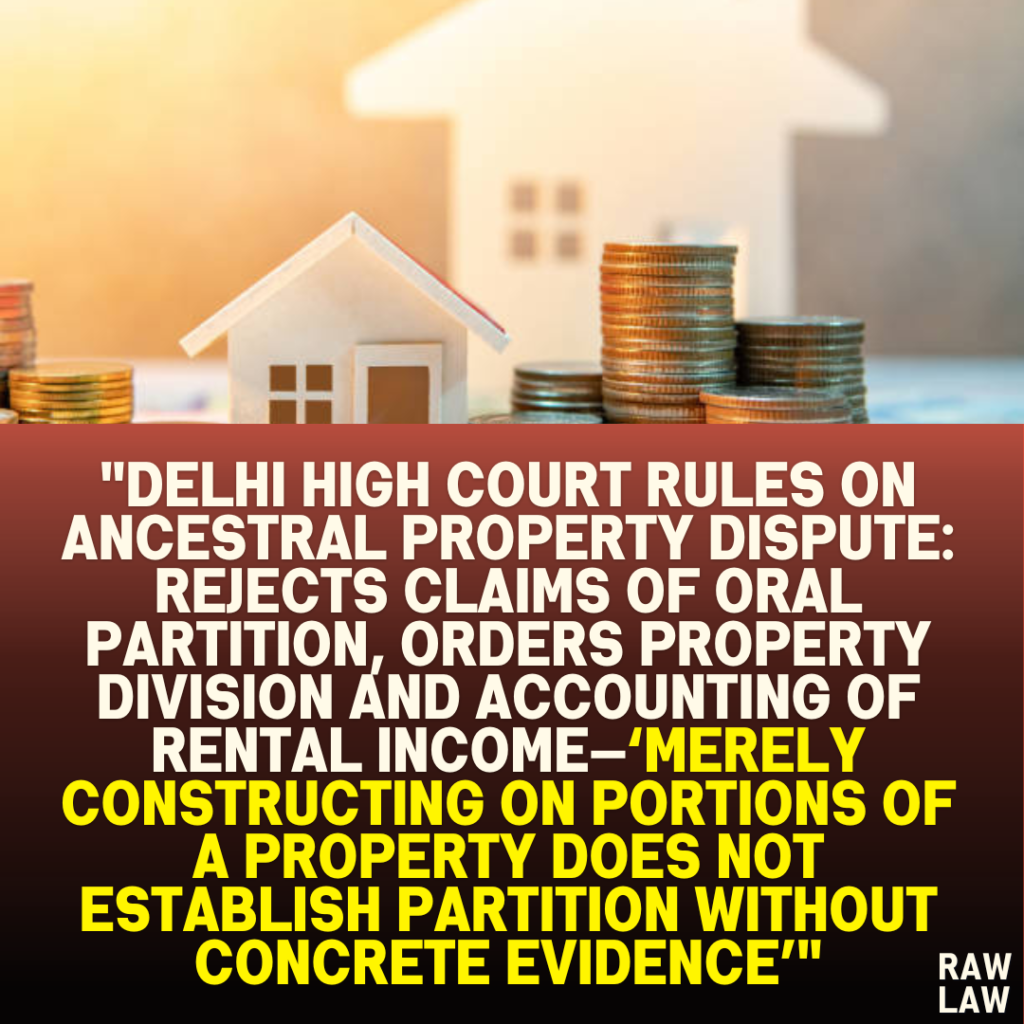Court’s Decision:
The Delhi High Court decreed a partition of the suit property, holding that the plaintiff and her two sons were each entitled to a 1/6th share, while the third defendant was entitled to half of the entire property. The Court also directed the first defendant to render accounts for the rent received on the property from 23.01.2018 onwards.
Facts:
The suit was initiated by the plaintiff seeking partition of a property located in Mansarovar Garden, New Delhi, which was initially owned by her husband’s grandfather. The plaintiff claimed that the grandfather executed a Will in 1970, dividing the property equally between his daughter and the plaintiff’s husband. After the deaths of the original owners and their successors, disputes arose between the family members regarding the division and rental income of the property.
The defendants included the plaintiff’s sons and relatives of the daughter of the grandfather. The plaintiff asserted that there had been an oral partition of the property, but this claim was refuted by the defendants.
Issues:
- Whether there was an oral partition between the two original beneficiaries.
- Whether the third defendant is the owner of half the undivided share in the suit property.
- Whether the plaintiff is entitled to a 1/6th undivided share in the property.
- Whether the suit property is liable to be partitioned and, if so, what would be the share of each party.
- Whether the plaintiff is entitled to rendition of accounts for the rental income against the first defendant.
- Relief and costs.
Petitioner’s Arguments:
The plaintiff argued that there was an oral partition of the property between her husband and his aunt. She also asserted that she was entitled to a partition of the property and rendition of accounts for the rental income received by the first defendant from letting out portions of the property.
Respondent’s Arguments:
The third defendant, who filed a counterclaim, refuted the plaintiff’s claims and argued that no oral partition had taken place. The defendant stated that the property remained undivided and that he was entitled to a half share due to a relinquishment deed executed by the other heirs. The first defendant contested the Will’s authenticity, claiming it was forged and fabricated.
Analysis of the Law:
The court analyzed the validity of the Will and the status of the property ownership. It observed that under Delhi law, there is no mandatory requirement to obtain Probate for a Will. The Will in question had already been deemed admitted by the defendants due to a procedural order. Consequently, the Court dismissed the first defendant’s challenge to the Will.
Precedent Analysis:
The Court cited the case of Kanta Yadav v. Om Prakash Yadav & Ors., (2020) 14 SCC 102, wherein it was held that obtaining Probate or Letter of Administration is not necessary in Delhi to prove a Will.
Court’s Reasoning:
The Court reasoned that, as the validity of the Will was no longer in question, the property should be divided in accordance with the testamentary dispositions. Since the oral partition was not substantiated with credible evidence, the property was considered undivided.
The first defendant, who was found to have been receiving rent, was ordered to render accounts for the rental income post-issuance of a legal notice in January 2018, as that is when the plaintiff formally sought her share.
Conclusion:
The Court passed a preliminary decree of partition, affirming that the plaintiff and her two sons are entitled to a 1/6th share each, while the third defendant is entitled to a half share. It also decreed that the first defendant shall render accounts of the rental income received from 23.01.2018 onwards.
Implications:
This ruling clarifies that the absence of a written partition agreement between family members does not necessarily imply division of property. Oral agreements must be substantiated with clear evidence, and procedural admissions can solidify the legal status of property claims.
The judgment also emphasizes the procedural importance of admissions under the Civil Procedure Code and the significance of timely challenging such orders.
